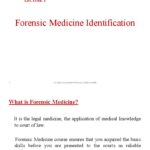The pursuit of forensic science, an endeavor where meticulous observation dances with rigorous analysis, necessitates a specific academic trajectory. Choosing the right A-levels isn’t merely about ticking boxes; it’s about forging the foundational bedrock upon which your forensic aspirations will stand. The A-levels you select will essentially be the alchemical ingredients for your future success. You need to consider them thoughtfully.
The Cornerstone: Chemistry
Imagine chemistry as the Rosetta Stone of forensic science. It unlocks the secrets hidden within bloodstains, trace evidence, and the very composition of matter. This discipline arms you with the lexicon to decipher the intricate chemical reactions occurring at crime scenes. Mastering chemical principles allows you to interpret the language of molecules, revealing vital clues that would otherwise remain obscured. Without a strong grasp of chemistry, much of the analytical work performed in forensic labs will remain opaque, like trying to read a book written in an unfamiliar hieroglyphic script. Understanding pH levels, molecular structures, and reaction kinetics is not just helpful, it’s essential.
The Analytical Eye: Biology
Biology, in the context of forensic science, transcends the rote memorization of anatomical diagrams. Think of it as the detective’s magnifying glass, revealing the intricacies of the human body and the biological world. A-level biology will arm you with a profound comprehension of DNA, the very blueprint of life, and its applications in forensic identification. You will delve into the complexities of serology, the analysis of bodily fluids, and the intricacies of entomology, where insects become silent witnesses to the passage of time. Consider the identification of pathogens, vital when investigating bioterrorism, or the study of decomposition, essential for estimating time of death. In essence, biology provides the framework to interpret the biological narratives woven into the fabric of a crime scene.
The Logician’s Toolkit: Mathematics
Mathematics might seem an unlikely companion in the realm of forensic science, but its role is paramount. Think of mathematics as the logical scaffolding that supports the entire edifice of forensic analysis. Statistical analysis, a cornerstone of evidence interpretation, relies heavily on mathematical proficiency. Consider the calculation of probabilities associated with DNA matches, or the application of statistical models to analyze crime patterns. Moreover, mathematical principles underpin the functioning of many analytical instruments used in forensic laboratories. Without a firm grounding in mathematics, you risk misinterpreting data, drawing flawed conclusions, and ultimately compromising the integrity of your investigation. Probability, statistics, and data analysis are your crucial allies.
Beyond the Core: Expanding Your Horizon
While chemistry, biology, and mathematics constitute the triumvirate of essential A-levels, other subjects can significantly enhance your forensic science profile. Physics, for example, provides insights into ballistics, accident reconstruction, and the analysis of physical evidence. Psychology offers a crucial understanding of criminal behavior, victimology, and the cognitive processes involved in eyewitness testimony. Even subjects like law or criminology, if available, can provide valuable context and a broader understanding of the legal system within which forensic science operates. Don’t restrict yourself to the purely scientific; consider the broader landscape.
Crafting Your Curriculum: Tailoring to Your Aspirations
The optimal combination of A-levels depends, to a degree, on your specific forensic aspirations. Are you drawn to the meticulous world of DNA analysis? Then a strong emphasis on biology and chemistry is paramount. Are you fascinated by the reconstruction of crime scenes and the analysis of physical evidence? Then physics should feature prominently in your curriculum. The key is to identify your particular area of interest and tailor your A-level choices accordingly. Research different forensic science degree programs and carefully scrutinize their entry requirements. Use this information to strategically construct a curriculum that aligns with your long-term goals. Think of it like building a customized toolkit, each A-level a specialized instrument designed for a specific task.
The Quintessential Skills: Beyond the Syllabus
A-levels provide more than just subject-specific knowledge. They are also crucibles for cultivating essential skills crucial for success in forensic science. Critical thinking, problem-solving, analytical reasoning, and meticulous attention to detail are all honed through rigorous academic study. These skills are not explicitly taught; they are implicitly embedded within the learning process. They are the invisible threads that bind together your knowledge base and enable you to apply your learning effectively. So, don’t just focus on memorizing facts and formulas; embrace the intellectual challenge of A-levels and cultivate the cognitive skills that will serve you well throughout your forensic career. Developing the ability to analyze information objectively and draw sound conclusions is invaluable.
The Long Game: University Admissions and Beyond
Your A-level choices are not just about meeting university entry requirements. They are about demonstrating your intellectual capacity, your passion for learning, and your potential for success in a demanding field. Universities are not simply looking for students with high grades; they are looking for individuals who possess the intellectual curiosity, the analytical skills, and the unwavering dedication required to excel in forensic science. Your A-levels are your opportunity to showcase these qualities and to convince admissions tutors that you are a worthy investment. Think of your A-levels as a stepping stone, not just to university, but to a fulfilling and impactful career in forensic science.
Choosing the right A-levels is not simply a matter of fulfilling prerequisites; it is a strategic investment in your future. It is about forging the foundational knowledge, cultivating the essential skills, and demonstrating the intellectual capabilities that will pave the way for a successful and rewarding career in the fascinating world of forensic science. Approach your A-level choices with diligence, foresight, and a genuine passion for the pursuit of knowledge, and you will be well-equipped to embark on your forensic journey. Remember, the right A-levels aren’t just about getting in; they’re about thriving once you’re there.










Leave a Comment